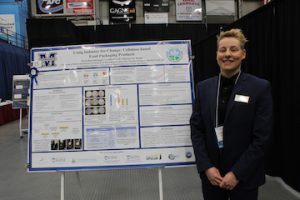2019 MSWC Winning Student Poster Highlight: Cellulose-based Food Packaging Products
Using Industry for Change: Cellulose-based Food Packaging Products
Undergraduate
Shayla Rose Kleisinger, University of Maine
First Place (tie)

Through an Interdisciplinary Undergraduate Research Collaborative (IURC) grant from the University of Maine and with Diana Davis Spencer Foundation funding through the Mitchell Center’s Partnership for a Sustainable Maine project, Shayla Rose Kleisinger is investigating how alternative food-packaging materials might both reduce plastic waste and help improve the shelf life of perishable foods.
Her research focuses on the use of biomaterials such as extremely thin, plant-based (cellulose) nanofibers (a human hair is about 80,000 nanometers thick) to replace non-biodegradable plastic food packaging. The research investigation is under the guidance of Balu Nayak, associate professor of food processing and Caitlin Howell, assistant professor of biomedical engineering.
The project is extremely relevant to understanding the feasibility of using cellulose nanofibers that incorporate a chemically-associated layer of food-grade oil to allow for the creation of an anti-adhesive barrier that discourages bacterial growth, while remaining food-safe.
“In the future, our plan is to test the developed packaging materials with different types of food products to evaluate their shelf-life improvement and co-relate that to the reduction in food waste,” notes Kleisinger.
This project is one of five undergraduate research projects included in a team-based learning group advised through the interdisciplinary Materials Management team at the Senator George J. Mitchell Center for Sustainability Solutions.
Coordinated by Brieanne Berry, a Ph.D. candidate in anthropology and environmental policy, the group is working to connect these five research projects through a call to action from the State of Maine to consider the use of pre-existing infrastructure to combat food waste, along with the larger policy implications of the work.
